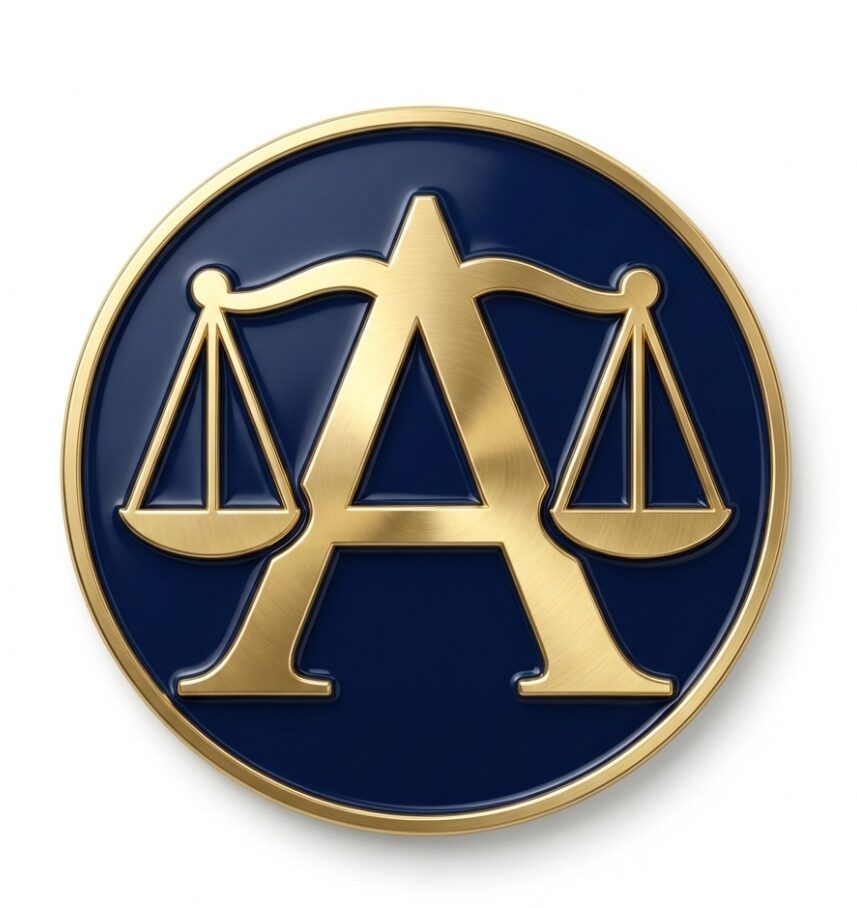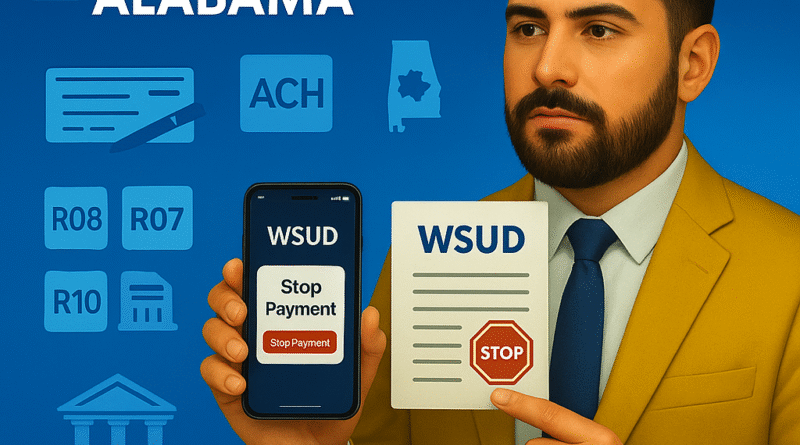ACH Stop Payments & WSUD in Alabama: R08/R07/R10 Made Easy (2025 Guide)
Summary (Consumer Accounts)
- Stop payment: For a preauthorized ACH debit, you can stop it by notifying your bank at least 3 business days before the scheduled date. 0
- Unauthorized debit: Your bank can return it using R10; you’ll usually sign a WSUD (Written Statement of Unauthorized Debit). 1
- Revoked authorization for recurring debits: bank returns with R07 after you revoke in writing and notify the bank. 2
- One-time stop or series stop: bank may use R08 for “payment stopped.” 3
- WSUD timing: as of Oct-1-2024, a WSUD may be signed on or after the date the entry is presented (you don’t have to wait for settlement). Electronic signatures are permitted under the Rules. 4
Alabama Escalation Paths
- CFPB complaint portal (checking & ACH disputes). 5
- Prudential regulator (OCC/FDIC/Federal Reserve) depending on the bank’s charter. 6
- Alabama State Banking Department consumer affairs complaint page. 7
ACH Dispute Map: R08 vs. R07 vs. R10
| Scenario | Your Action | Bank’s Return Code | Authority |
|---|---|---|---|
| A scheduled, authorized debit you want to block this month | Stop payment ≥3 business days before date (phone or written; bank may require written confirmation) | R08 Payment Stopped | Reg E §1005.10(c); Nacha R08 definition. 8 |
| You previously authorized recurring debits but now revoked authorization | Revoke with the biller and notify the bank to block future debits | R07 Authorization Revoked | Nacha guidance on “authorization revoked”. 9 |
| A debit you never authorized (fraud/mistake) | File unauthorized debit claim; sign WSUD (paper/online) | R10 Customer Advises Unauthorized | Nacha return code; WSUD requirement. 10 |
Banks are also bound by Reg E error-resolution for consumer accounts when you allege an unauthorized EFT and give timely notice. 11
How to Place an ACH Stop Payment (Consumer)
- Identify the debit (merchant name, exact amount/date, and whether it’s one-time or recurring).
- Notify your bank at least 3 business days before the scheduled date—phone or in writing. Ask for a confirmation number. If your bank requests written confirmation, send it promptly (some banks require it within 14 days). 12
- Clarify scope: stop one item, an entire series, or all future debits from the same originator. Under Nacha, RDFIs must honor stop orders given in time and manner that allow action prior to posting (including “Subsequent Entries”). 13
- Check fees and duration: Some institutions charge a stop-payment fee and set a duration for non-consumer accounts; consumer stop orders for series typically remain until you lift them (see your account terms). Nacha has clarified banks must honor stop orders on subsequent entries when timely. 14
- Monitor your account. If the debit still posts, immediately file an unauthorized claim and request return/recredit under Reg E, in addition to the Nacha return. 15
WSUD (Written Statement of Unauthorized Debit): What It Is & How to Use It
A WSUD is the consumer’s signed statement that an ACH debit was unauthorized, a key prerequisite for banks to return the entry under Nacha rules (e.g., R10). As of Oct-1-2024, a WSUD may be signed on or after the date the entry is presented (including when you see a pending alert)—you don’t have to wait for the settlement date. Electronic signatures are allowed. 16
Required Content (typical)
- Account holder name and account number.
- Company name (originator), amount(s), and date(s) of the debit(s).
- Reason: never authorized, authorization revoked, or not in accordance with authorization.
- Date when you first learned of the debit.
- Certification language and signature (wet or electronic). 17
RDFIs must obtain a signed WSUD for consumer unauthorized returns and keep/provide it if the ODFI requests (generally within 10 banking days). 18
Good to Know
- No notarization is required by the Nacha Rules; CFPB has also objected when banks added unnecessary hurdles. 19
- The WSUD can be collected electronically (similar authentication). 20
- RDFIs must retain a copy (often one year+ depending on the return) and furnish it to the ODFI upon request. 21
Paste-Ready WSUD (consumer)
WRITTEN STATEMENT OF UNAUTHORIZED DEBIT (WSUD) Account Holder: [Name] Phone/Email: [___] Bank / Account: [FI name] [Account last 4: ____] Originator Name: [Company/Biller] Company ID (if shown): [____] I state that the ACH debit(s) listed below were unauthorized, or the authorization was revoked, or the entry was not in accordance with the terms of my authorization. Date(s) & Amount(s): [mm/dd/yyyy – $____] [Add lines as needed] I first learned of the debit(s) on: [mm/dd/yyyy] Check ONE: [ ] I did not authorize the debit(s). [ ] I revoked authorization with the company on [mm/dd/yyyy]. [ ] The debit was not in accordance with my authorization (explain): [______]. I certify that the above is true. I understand this claim may be shared with the originating bank. Signature (wet or electronic): ____________________ Date: [mm/dd/yyyy]
Tracks common WSUD fields used by the Federal Reserve reference guide and Nacha model form. 22
Quick Guide (Alabama) — 8 Steps
- Identify the entry (originator, amount, SEC code if visible).
- Choose the path:
- Stop one payment or a series: place a stop payment ≥3 business days before the date (R08). 23
- Never authorized: complete a WSUD and ask the bank to return as R10. 24
- Authorized but revoked: revoke with the biller and instruct bank to block future debits (R07). 25
- Act quickly: under Reg E, report unauthorized EFTs within 60 days of the statement to limit liability for subsequent debits; sooner is better. 26
- Use electronic WSUD if your bank offers it; you may sign the same day you see the pending debit. 27
- Track outcomes: confirm the return posted and fees reversed.
- Escalate if denied: CFPB complaint portal; also the OCC/FDIC/Federal Reserve as applicable; the Alabama State Banking Department accepts state complaints. 28
- Document everything: call logs, screenshots, bank messages, and your WSUD.
- Prevent repeats: set alerts, review statements weekly, and block the originator for future debits (series stop). 29
Timelines & Responsibilities
| Item | Timeframe | Rule/Source |
|---|---|---|
| Consumer stop payment for preauthorized EFT | At least 3 business days before scheduled date | Reg E §1005.10(c) & Commentary. 30 |
| WSUD signature timing | On/after the date the entry is presented (no need to wait for settlement) | Nacha Oct-1-2024 rule update. 31 |
| RDFI must furnish WSUD to ODFI upon request | Within 10 banking days (if requested within 1 year of return) | Payments association guidance (EPCOR). 32 |
| Banks must honor timely stop orders on “subsequent entries” | When provided in time/manner to act before posting | Nacha clarification & Rule 3.7.1.2 reference. 33 |
Note: Financial institutions may also process “Request for Return (R06)” items where ODFI/RDFI agree on a return; RDFIs must respond to such requests within 10 banking days (effective Apr-1-2025). 34
Consumer vs. Business Accounts
Most of this guide addresses consumer accounts, where Reg E governs error-resolution and liability. Business accounts are not covered by Reg E; they rely on Nacha Rules, account agreements, and UCC Article 4A (for certain credit transfers). Many banks still accept stop-payment orders for business ACH debits and may return unauthorized corporate debits as R29 (“corporate customer advises not authorized”). Check your treasury agreement for exact timelines and fees; Nacha has also addressed expiration/handling of stop-payment orders on non-consumer accounts via minor rule topics. 35
FAQ
1) If I miss the 3-day window, can my bank still stop it?
Possibly. The 3-day rule is the Reg E minimum for preauthorized transfers. Banks may still attempt to block the item or return it post-posting via R10 (unauthorized) or R07 (revoked) depending on facts. Act immediately and put your request in writing. 36
2) Do I need to notarize a WSUD?
No. The Nacha Rules require a signature or similar authentication; notarization is not required and the CFPB has discouraged unnecessary hurdles. 37
3) Can I sign a WSUD electronically?
Yes. Nacha expressly allows electronic WSUDs (e-sign). 38
4) What if the debit is recurring but I want to cancel future ones?
Revoke authorization with the biller and notify your bank to block future debits; the bank can return such items with R07. 39
5) I see a “pending” debit today—can I submit WSUD now?
Yes. Since Oct-1-2024, the WSUD may be signed on or after presentation (including a pending alert). 40
Further reading:
6) Who do I escalate to in Alabama if my bank refuses?
File at the CFPB portal and with your bank’s federal regulator (OCC/FDIC/Federal Reserve). Alabama consumers can also file with the State Banking Department. 41
7) Does Reg E force the bank to use a specific Nacha code?
No. Reg E sets consumer rights and timing; Nacha defines ACH processing (e.g., R08/R07/R10). Banks apply both frameworks together. 42
8) Will my stop payment expire?
Consumer stop orders for a series usually remain until you cancel; single-entry stops apply to that entry. Bank terms can add specifics; Nacha has clarified honoring stop orders on subsequent entries when timely. 43
9) What documentation should I keep?
Copies of your stop-payment request or WSUD, bank messages, statement highlights, and any revocation sent to the biller. (Banks may need to share WSUD with the ODFI within 10 banking days.) 44
10) I’m a business—what code applies if I didn’t authorize?
For corporate accounts, banks often use R29 (“corporate customer advises not authorized”). Review your treasury agreement for deadlines and any indemnity language. 45
Technical / Legal Basis (Primary & Authoritative)
- Regulation E — 12 CFR §1005.10(c) (consumer right to stop preauthorized transfers; interpretations). 46
- Regulation E — 12 CFR §1005.11 (error-resolution framework for unauthorized EFTs). 47
- Nacha Rules — WSUD timing update & requirement; acceptance of e-signature; honoring stop orders on subsequent entries. 48
- Return codes — R10 unauthorized, R07 authorization revoked, R08 payment stopped (industry references). 49
- WSUD content/format — Federal Reserve ACH reference guide; retention & 10-day furnish to ODFI (payments association guidance). 50
- Escalation — CFPB complaint portal; OCC HelpWithMyBank; FDIC Consumer Response; Federal Reserve Consumer Help; Alabama State Banking Department. 51
Conclusion
For Alabama consumers, the fastest path to results is: decide whether you need a stop payment (R08), a revocation (R07), or an unauthorized return with a WSUD (R10); act within the Reg E timelines; and keep a tight paper trail. Use the modern WSUD timing and e-signature options to move quickly, and escalate through the CFPB, your bank’s federal regulator, and the Alabama State Banking Department if your bank stalls or mishandles the claim. 52
Disclaimer
This guide is general information for Alabama consumers about ACH stop payments and WSUDs. It is not legal or financial advice and does not substitute for an attorney. Always review your account agreement and consult counsel for your specific facts.

